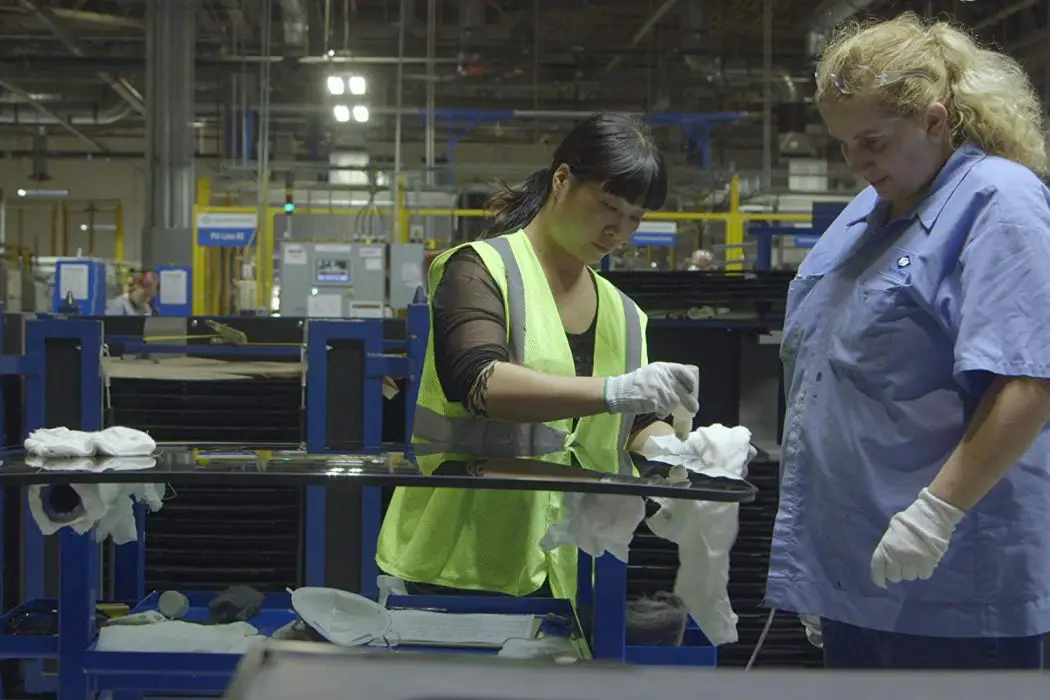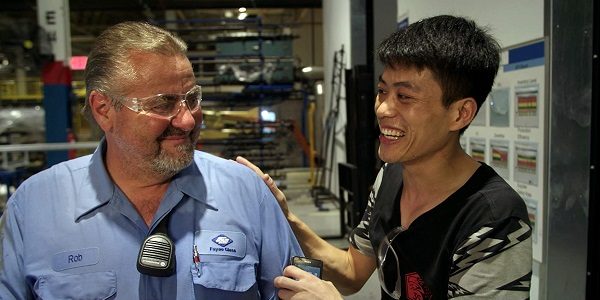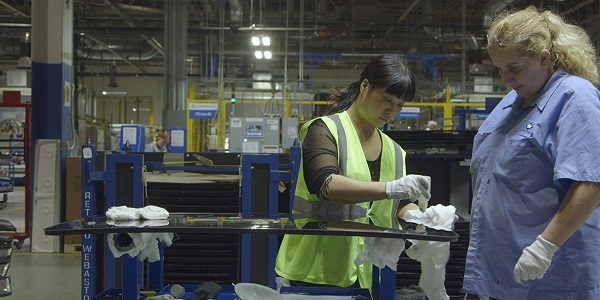AMERICAN FACTORY: Far From Home

Janet is a writer based in Salt Lake City. A…
As our world becomes increasingly digital and high tech, we hear and see more words like “automation,” “globalization,” and “integration.” They fire up the idea and notion that our lives are becoming more modernized and our favorite–diverse. Those words often carry positive connotations, or at least should, to the modern American economy. But how exactly does modernization and diversity take root especially when it comes to the workplace?
Directors Julia Reichert and Steven Bognar explore two cultures who come together to be a part of what is hoped to be, the next best manufacturing investment in their latest documentary, American Factory. Having made its premiere at the 2019 Sundance Film Festival, this documentary is a fascinating and entertaining piece that navigates us through the ups and downs (well, mostly downs) of two work cultures trying to take root in a place full of potential.
As the film pokes at the whole melting pot versus salad bowl debate, it opens the conversation on the American Dream – what it means and the kinds of sacrifices people take to achieve it. Moreover, it reflects upon the loss experienced as a result of the fast paced industrial economy.
Fuyao Glass America – A Chance For A New Beginning
In their previous documentary, The Last Truck, Reichert and Bognar documented the 2008 General Motors plant shutdown in Dayton, Ohio, resulting in a loss of 10,000 jobs. The filmmakers continue this journey with the re-opening of the plant in American Factory.
The journey begins with optimism and joy. A Chinese auto glass manufacturer buys the former GM plant to open Fuyao Glass America. It promises to open hundreds of jobs in a state that significantly suffered from unemployment. Part of the plan is to bring a group of workers from China whose job will be to train and lead the American workers in their workflow. The Chinese workers are leaving their families behind for whom they probably won’t see in over a year.

It’s a beacon for the town that experienced tremendous loss. Not only is it finally Dayton’s time of opportunity and hope but redemption. The American workers are excited and grateful, as many of them were not able to find employment since GM’s closing.
When In Rome, Do As The Romans Do
There’s a lot of camaraderie in the air, but the establishment of a new investment, foreign investment for this matter, comes with the growing pains of a new business model. Chairman Cao, CEO of Fuyao, firmly states, as he plans for his company’s debut, will be an American company. “When in Rome, do has the Romans do,” he says, plain and simple.
Well, it proves to be not so simple. It’s actually really complicated. Challenges of workplace culture rapidly rise, as the two countries carry very different expectations and work styles on the factory floor. It’s essentially Communism and Democracy in the workplace that fleshes out, as you would expect, poorly. Work culture affects pay, expectations, and relationships. It affects the way people are looked at, which becomes an interesting and entertaining character study in the documentary. It’s also an area to which Reichert and Bognar intuitively thread in humor.

There’s a lot of honest and humorous cultural commentary when the Chinese are talking about Americans and vice versa. There’s a scene where the workers from China are given an orientation, and the Chinese executive who is hosting the meeting shares blunt and at times, very true comments about Americans. He uses words like “casual,” “direct,” and “lazy” to describe their future work mates.
As concerns of workplace safety, lunch breaks, and work hours emerge, it turns into a grim story, with union strikes sprouting. Fuyao rapidly starts to become far from an American company. Employees are soon forced to abide by the submissive and strict nature of Chinese customs; many find themselves back in bleak circumstances that they were in prior.
Fleshing Out Complexities On Both Sides
On the surface, there are certainly a lot of “American” things about Fuyao Glass America. It’s a powerhouse nestled in the Midwest that opened with the intention of providing numerous jobs that were once lost. But beneath all of that, it’s a company that, from its homeland, carries submissive, disciplined, and anti-union tactics that clash with American democracy – speaking out and fighting for workplace safety and regulations. There’s a lack of empathy on both sides to regulate these differences.

This documentary could have easily strayed into xenophobic territory (although I’m sure there just had to have been some racist commentary in there somewhere that the filmmakers cut out). When watching, I couldn’t help but feel that the film would easily steer as anti-Chinese; and there’s certainly many opportunities to open that gate throughout the film. But Reichert and Bognar made sure to flesh out the complexities of both sides, offering unbiased and conscientious perspectives. They dive deep into the sacrifices each person has taken in order to show up every day on the plant floor.
The level of access and trust that the filmmakers had filming their project is impressive. Running at 115 minutes, there’s a lot that happens and a lot of people that we meet. Reichert and Bognar draw out a detailed, absorbing, and diligent arc that weaves through the American Dream, the power struggle, and impending future of machinery and automation. It’s very sentimental, as they all encompass misunderstanding and loss on both sides.
Conclusion: American Factory Evokes Absorbing Storytelling
As a second-generation Asian American, I felt pretty connected with the dichotomy that Fuyao created. The immigrant mentality of communal acquiescence along with American individualism have both been a part of me growing up. So this film proved to be very absorbing. American Factory provides very intuitive social and political commentary that interestingly brings up the question of identity. They bring up the same question that I think a lot of second generation individuals have grappled with. It’s the same question that was posed to Fuyao: how American are you?
The duality that the Fuyao sought fruition in makes for a compelling case and character study. The filmmakers do an excellent job in conveying the complexities of both sides. Hopefully, these complexities will illuminate and steer more insightful conversations of what globalization and identity mean.
What does the American Dream mean to you? Please share by commenting below.
Watch American Factory
Does content like this matter to you?
Become a Member and support film journalism. Unlock access to all of Film Inquiry`s great articles. Join a community of like-minded readers who are passionate about cinema - get access to our private members Network, give back to independent filmmakers, and more.
Janet is a writer based in Salt Lake City. A strong advocate for underrepresented voices, she believes cinema is a transformative medium that challenges assumptions and creates diverse conversations.













